蛙の子は蛙とは?
「蛙の子は蛙」(かえるのこはかえる)は、親と子は本質的に似ているものであり、子どもは親の才能や性質を受け継ぐことを表すことわざです。
親が平凡であれば子も平凡であり、親の特徴や能力を超えるのは難しい、というやや諦めや皮肉を含むニュアンスで使われることがあります。
言葉の意味
蛙
「蛙」は、田んぼや水辺などで見られる平凡で身近な動物の代表格。
日本の文化では「平凡さ」を象徴する存在として比喩的に使われます。
蛙の子
「蛙の子」は、親から生まれた子ども、すなわちオタマジャクシを指します。
蛙の子は成長してもやはり蛙であり、大きく異なる存在にはなり得ないという考えを象徴しています。
全体の意味
子どもは親の影響を強く受けるため、親と似たような性質や能力を持つ、という教訓的な意味を持つことわざです。
背景と由来
日本の家族観と教育観
昔の日本社会では、家業や伝統が親から子へと引き継がれるのが一般的でした。
そのため、子どもが親に似ることは自然なことであり、才能や境遇も親の影響を受けるという考えが根付いていました。
生物学的な観点
生物学的には、子どもが親から遺伝子を受け継ぐため、性質や行動が似ることが多いです。この現象を比喩的に表現したものと考えられます。
比喩としての蛙の選択
蛙は特別な存在ではなく、どこにでもいる平凡な生き物とされてきました。そのため、「親と子は似ている」という平凡さを表現するのにふさわしい象徴となっています。
使用される場面
才能や能力の限界を表現する場合
例:「彼の息子もスポーツが苦手だね。やっぱり蛙の子は蛙だ。」
親が特別な才能を持たない場合、子どもも同じであることを指摘。
子どもの性質が親に似る場合
例:「あの子、父親そっくりだね。蛙の子は蛙って言うけど本当にそうだ。」
性格や行動、外見などが親に似ていることを表現。
社会的階層や境遇が似る場合
例:「親が商人だから息子も商人になるのか。蛙の子は蛙だな。」
親の職業や生活環境が子どもに引き継がれることを示唆。
ポジティブな側面とネガティブな側面
ポジティブな側面
「遺伝的な特徴や才能の継承」:子どもが親から良い才能や特性を受け継ぐ場合には、この言葉が肯定的に使われることもあります。
例:「彼の音楽の才能は父親譲りだね。蛙の子は蛙だよ。」
「家族の一体感や連続性」:親と子が似ていることは家族の絆や伝統の継承を感じさせるものでもあります。
ネガティブな側面
「平凡さや限界の象徴」:「蛙」という生物が特別ではないことから、平凡な存在に留まることを皮肉っぽく指摘する場合があります。
例:「彼が大成功するなんて思えないよ。だって蛙の子は蛙だし。」
「社会的階層の固定化」:親と子の境遇や環境が似てしまうことで、努力しても超えられない壁があると感じさせる側面もあります。
現代社会との関連性
遺伝だけではない要素
現代では、子どもが親に似る理由は遺伝だけでなく、環境や教育の影響も大きいとされています。
育つ家庭環境や価値観が子どもの性格や能力形成に大きな影響を与えるため、「蛙の子は蛙」と言われる現象が強調されます。
社会的な流動性
現代では教育や努力によって、親と異なる人生を歩むことも可能になっています。
そのため、「蛙の子は蛙」は必ずしも絶対的な真理ではありません。
類似の表現
日本語の類義語
「子は親に似る」:子どもが親と性質や能力を共有することを表すシンプルな表現。
「血は争えない」:親と子の性質や行動が似ていることを血縁の視点から表現。
「親の因果が子に報う」:親の行動や境遇が子どもに影響を与えることを表す言葉。
英語の類似表現
「Like father, like son.」:「父親と息子は似る」という意味で、親と子が似ていることを表現。
「The apple doesn’t fall far from the tree.」:「リンゴは木の近くに落ちる」という比喩で、親子の似た性質を指します。
「蛙の子は蛙」ということわざは、親子の間の類似性を象徴するものであり、子どもが親の影響を受けやすいことを示しています。
この表現からは以下の教訓が得られます。
「遺伝や環境の影響を理解する」:親が子どもに与える影響の大きさを認識し、良い影響を与える努力をすることが大切です。
「限界を決めつけない」:このことわざには諦めや皮肉のニュアンスが含まれる場合もありますが、現代社会では努力次第で親を超える可能性もあります。
親と子の類似性を受け入れる一方で、子どもが独自の道を切り開く可能性も尊重するバランスが求められます。
Kaeru no ko wa kaeru (A frog’s child is a frog) is a proverb that expresses that parents and children are similar in nature, and that children inherit the talents and characteristics of their parents.
It is sometimes used with a somewhat resigned or ironic nuance, saying that if the parents are mediocre, the children are also mediocre, and that it is difficult to surpass the characteristics and abilities of the parents.Meaning of the word
Frog
The “frog” is a representative of the mundane and familiar animals found in rice paddies and by the water.
In Japanese culture, it is used metaphorically as a symbol of “ordinariness.Frog cub
A frogling is a child born from a parent, i.e., a tadpole.
It symbolizes the idea that the child of a frog is still a frog when it grows up and cannot be very different.Overall meaning
The proverb has the didactic meaning that children are strongly influenced by their parents and thus have similar characteristics and abilities to their parents.Background and Origin
Japanese View of Family and Education
In ancient Japanese society, it was common for family business and traditions to be passed down from parents to their children.
As a result, the idea took root that it was natural for children to resemble their parents and that their talents and circumstances were also influenced by their parents.Biological Perspective
Biologically, children inherit genes from their parents and therefore often resemble them in nature and behavior. This phenomenon is thought to be expressed metaphorically.Choice of Frog as Metaphor
Frogs have been regarded as ordinary creatures found everywhere, not special beings. Therefore, it is an appropriate symbol to express the banality of “parents and offspring are alike.Situations in which it is used
When expressing the limitation of talent or ability.
Example: “His son is not good at sports either. After all, a frog’s child is a frog.”
Pointing out that if a parent does not have a special talent, the child is the same.When a child’s nature is similar to that of his or her parents.
e.g. “That boy looks just like his father. They say a frog’s child is a frog, and it’s true.”
Expresses that the child resembles the parent in character, behavior, appearance, etc.When social class or circumstances are similar.
Example: “Because his parents are merchants, his son will also become a merchant. The son of a frog is a frog.”
Suggests that the parents’ occupation or living environment is inherited by the child.Positive and Negative Aspects
Positive Aspects
Inherited traits or talents”: This term may be used positively when a child inherits good talents or traits from his or her parents.
For example: “His musical talent is inherited from his father. A frog’s child is a frog.”
Family togetherness and continuity: The resemblance between parents and children also evokes a sense of family bonding and inheritance of traditions.Negative aspects
Symbol of mediocrity and limitation”: The fact that the creature ‘frog’ is not special may ironically point out that it remains in a mediocre existence.
Example: “I don’t think he’s going to be very successful. A frog’s child is a frog.”
Fixation of social stratification”: One aspect of this is the similarity between the circumstances and environment of parents and children, which makes them feel that there are barriers that cannot be overcome despite their efforts.Relevance to modern society
Factors other than genetics alone
In modern society, the reason why children resemble their parents is not only genetics, but also the influence of environment and education.
The family environment and values in which a child is raised have a significant impact on the formation of the child’s personality and abilities, emphasizing the phenomenon known as “a frog’s offspring is a frog’s offspring.Social mobility
Today, through education and hard work, it is possible to lead a life different from that of one’s parents.
Therefore, “a frog’s child is a frog” is not necessarily an absolute truth.Similar expressions
Japanese Synonyms
A child is like its parents”: a simple expression that describes how children share qualities and abilities with their parents.
Blood is no contest”: an expression that describes the similarity in nature and behavior between parents and children from the perspective of blood relationship.
Parents’ karma rewards their children: This phrase expresses the influence of parents’ actions and circumstances on their children.Similar expressions in English
Like father, like son.”: This phrase means that the father and the son are alike, expressing the similarity between the parent and the child.
The apple doesn’t fall far from the tree.”: ‘The apple doesn’t fall far from the tree,’ a metaphor referring to the similar nature of parents and children.The proverb “A frog’s offspring is a frog” symbolizes the similarity between parents and offspring, indicating that children are easily influenced by their parents.
The following lessons can be learned from this expression.Understand the influence of heredity and environment: It is important to recognize the magnitude of the influence that parents have on their children and to strive for positive influence.
Don’t set limits”: While this proverb may have nuances of resignation or sarcasm, in today’s society it is possible to surpass one’s parents through hard work.A balance must be struck between accepting the similarities between parents and children, while also respecting the possibility that the child will forge his or her own path.
AIが描いた「蛙の子は蛙」
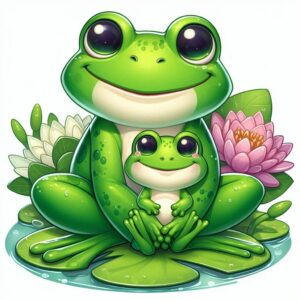
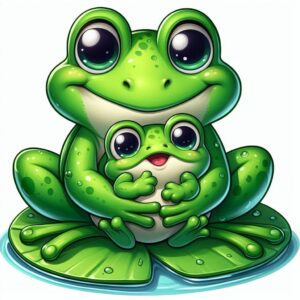
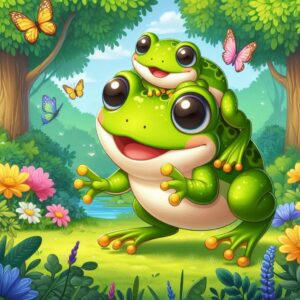
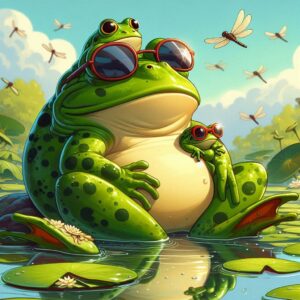
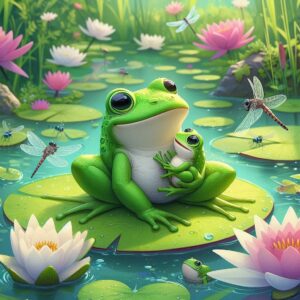
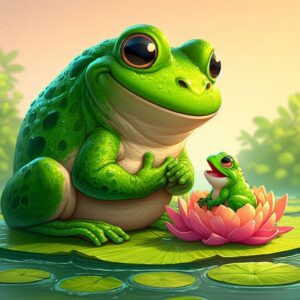

コメント